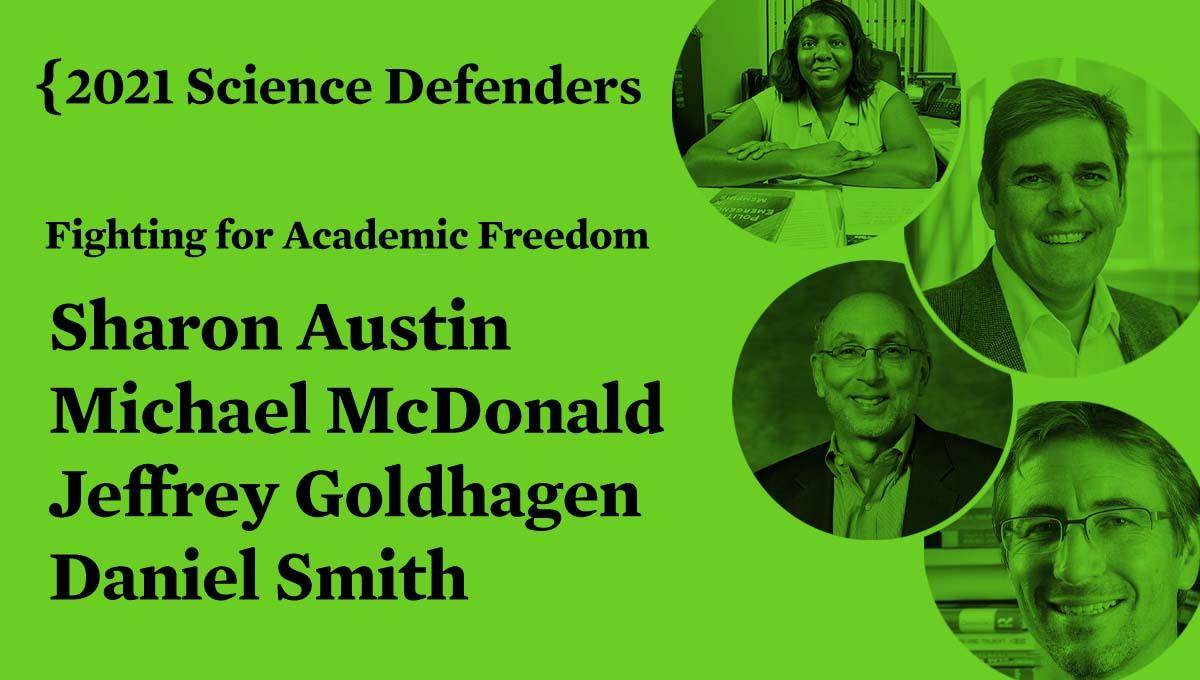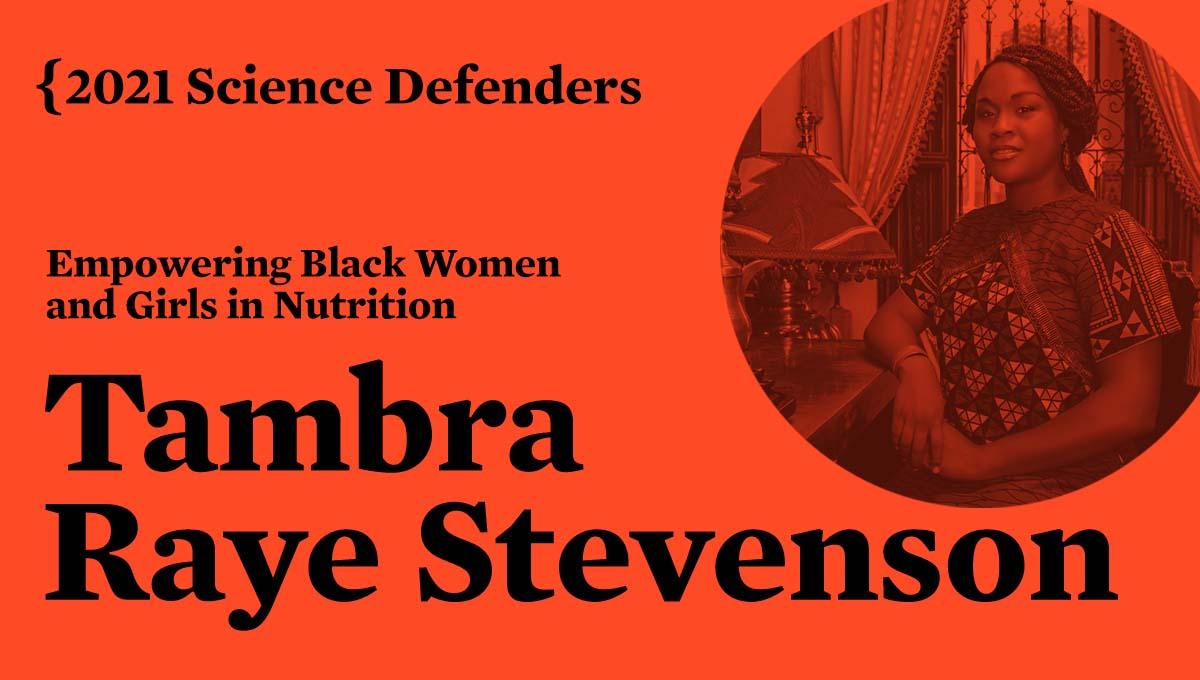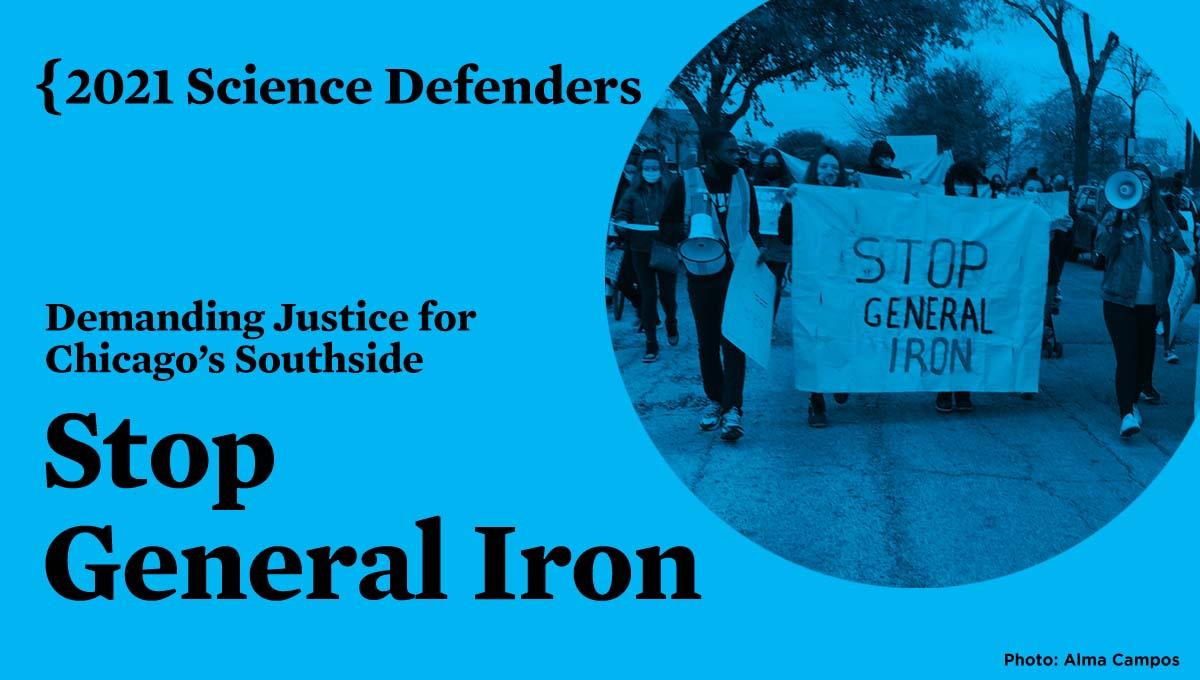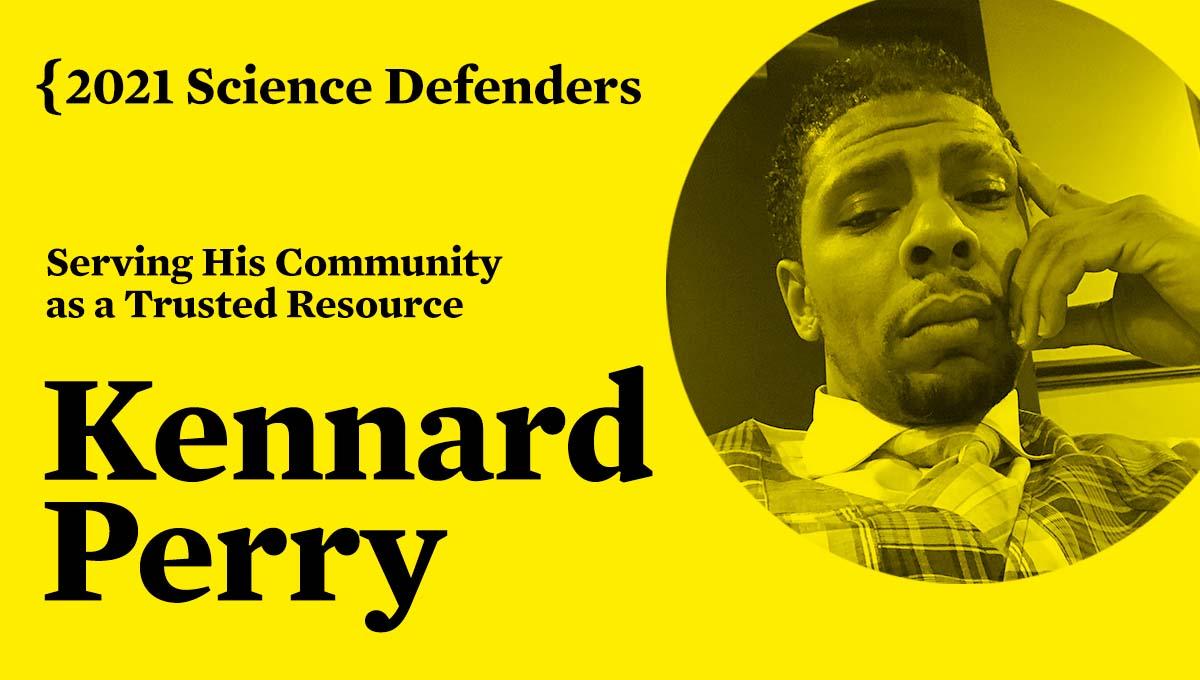Each year, the Union of Concerned Scientists honors a few individuals and groups who have taken a stand for science to help their communities and benefit the public good. This year's winners have done so in the face of political pressure, structural injustices, and long odds. It's our honor to announce the 2021 Science Defenders.

Dr. Sharon Austin, Dr. Jeffrey Goldhagen, Dr. Michael McDonald, and Dr. Daniel Smith: Fighting for Academic Freedom
As the state of Florida and its governor Ron DeSantis face legal challenges to controversial new laws and policies, the University of Florida system has attempted to prevent its faculty from offering expert testimony that opposes these laws and policies. This effort to stifle the free speech of state-employed professors spans campuses and areas of expertise: while Drs Austin, McDonald, and Smith are political science professors at the University of Florida’s Gainesville campus, Dr. Goldhagen is a professor of pediatrics in Jacksonville.
Dr. Goldhagen, who has taught at the University of Florida’s College of Medicine for nearly 30 years, was asked to submit a statement supporting a challenge to DeSantis’ ban on mask mandates in Florida public schools. The other professors were asked to testify in a legal case challenging a recent law restricting access to voting in Florida; the plaintiffs challenging the law claim it is intended to diminish turnout among Black voters. Dr. Austin studies Black voters and political behavior, Dr. McDonald is a national elections expert, and Dr. Smith is the chair of their department. All four professors were initially denied the right to speak by the University of Florida system.
It is standard practice for faculty members and other experts to be hired by legal teams to present testimony based on their expertise in court cases; it is not standard for a university system to deny its faculty permission to do so. The University of Florida, in its initial denials, pointed to what they described as a conflict between the professors’ potential testimony, and state-promoted policies.
“Academic institutions are a profoundly important source for accruing and disseminating expertise,” says Dr. Goldhagen. “Any limitation placed on the roles and function of academic institutions and faculty in this regard is an assault on the pursuit of equity and human rights.”
While the University of Florida relented and agreed to let the three political scientists testify in court, the professors, including Dr. Goldhagen, have filed a federal lawsuit to ensure that their right—and all academic experts’ rights—to free speech be codified and not subject to political interests on a case-by-case basis.

Tambra Raye Stevenson: Educating the Next Generation of Black Women Leaders in Nutrition
Tambra Raye Stevenson began noticing a pattern as many members of her family were diagnosed with diseases such as cancer, diabetes, and heart disease. She realized that these diseases are becoming more prevalent among people in Africa and their descendants in the United States and recognized a key determinant: a food and nutrition system that is fraught with racial inequity. In response, Stevenson studied nutrition, earned a degree in public health, and founded WANDA: Women Advancing Nutrition Dietetics and Agriculture, a nonprofit that seeks to change a nutritional landscape that today benefits only a select few.
To address this issue, WANDA has worked to improve access to nourishing food and provided free nutrition classes in the Washington, DC, area. The group highlights that fewer than three percent of registered dieticians-nutritionists in the United States are Black, and that more than 90 percent of Black farmers have lost their land. As Stevenson explains, WANDA is creating a pipeline of “frontline food freedom fighters,” putting women and girls of African descent at the forefront of a movement by providing them with opportunities to be community leaders on the issue of nutrition.
Stevenson says, “How can we Black women reclaim our food system that has historically always exploited our labor, our knowledge, and our culture? We reclaim that by reconnecting to our power source, which is our ancestral roots, and being able to understand that our voice matters.”
Now Stevenson’s impact on our food system will likely grow: US Department of Agriculture Secretary Tom Vilsack announced in 2021 that she will serve on the agency’s National Agricultural Research, Extension, Education, and Economics Advisory Board, providing input on several USDA programs and projects.

Stop General Iron: Demanding Justice for Chicago’s Southside
Chicago’s Southeast Side is a neighborhood unjustly overwhelmed by pollution: from the cargo ships unloading at the Port of Chicago to the many industrial facilities such as chemical processing plants and long-closed plants that shut down without cleaning up. It’s also a neighborhood whose residents have organized and advocated for healthier air, water, and soil for decades.
When General Iron, a car- and metal-shredding business, received approval from the city to move its scrapyard from the predominantly white and wealthy North Side neighborhood to the majority Latino Southeast Side, residents had had enough. Southeast Side Environmental justice groups, and community leaders banded together in a campaign they called Stop General Iron.
The campaign drew upon existing environmental justice organizations—including the Chicago Southeast Coalition to Ban Petcoke, the Little Village Environmental Justice Organization, People for Community Recovery, the Southeast Environmental Task Force, and the Southeast Youth Alliance—that had long fought to address existing environmental hazards in the area.
The new coalition, Stop General Iron, petitioned the city’s health department to deny an operating permit for the building. Members weighed in at public meetings about the health impacts of the proposed relocation. Oscar Sanchez, co-founder of the Southeast Youth Alliance, went on a hunger strike in protest, along with other community members. And they took legal action, filing a civil rights complaint against the city of Chicago with the Department of Housing and Urban Development (HUD), and petitioning for federal intervention from the Environmental Protection Agency (EPA).
So far, Stop General Iron has succeeded: the permit for the facility is now on hold while the EPA investigates whether the decision to relocate the business is a civil rights violation. HUD is also investigating the city’s zoning practices and has opened an inquiry into whether residents’ civil rights have been violated under fair housing laws.
In an interview with NBC News, Peggy Salazar, a lifelong resident of the Southeast Side and former executive director of the Southeast Environmental Task Force, said “They’re thinking, ‘This place is already contaminated, so what’s a little more?’ But we’re not going to accept it anymore like we did for so long. We are going to fight for the transformation of our community.”

Kennard Perry: Serving His Community as a Trusted Resource
Because of racism in the country’s healthcare system, and racist inequities in exposure to air pollution that can exacerbate respiratory infections, Black people in the US are likelier to become sicker–and to die– from COVID-19 than almost any other group. Vaccination against COVID-19 lowers the risk of severe infections resulting in hospitalization and death. While white people account for the largest share of people in the US who remain unvaccinated, demographic surveys find that Black people have tended to be less likely than white people to get vaccinated, since vaccines have been available.
Public discourse on vaccine reluctance among Black people centers a historic distrust of the healthcare system. However, it’s still the case that many Black people have less access to affordable healthcare, reliable information about public health, and compassionate care from healthcare providers. In Baltimore, at the Black-owned barbershop where he’s worked for more than two decades, Kennard Perry is doing his part to fill some of these gaps–and spread truth about the safety and efficacy of COVID-19 vaccines among his clientele.
“What I love about being a barber is my ability to not only interact with the community, but to actively, positively affect it as well,” Perry says. He has cultivated trust among his clients, and many of them end up confiding their hesitancies or misgivings about vaccination in their visits to his chair.
“I felt it was my obligation to stand in the gap to properly inform our people about this virus,” he says. Perry participated in a White House initiative to train barber and beauty shops to address their clients’ questions about COVID-19 vaccines. Now, when his clients express reservations, he listens compassionately and describes his own motivation for being vaccinated.
“Black people are at the frontline of being affected by this pandemic,” he says. “I have a responsibility to my community. The most rewarding aspect of this journey has become about the real relationships that are forged when people truly trust you. If it's not about relationships, it's not about anything.”